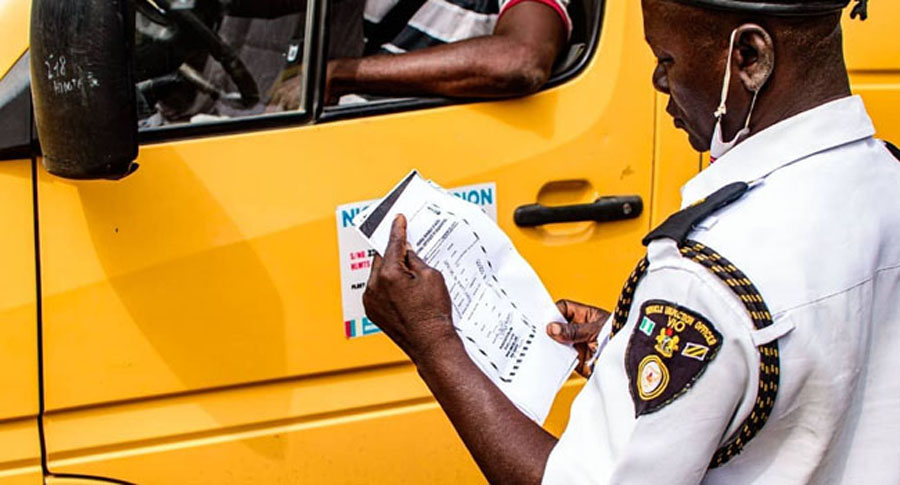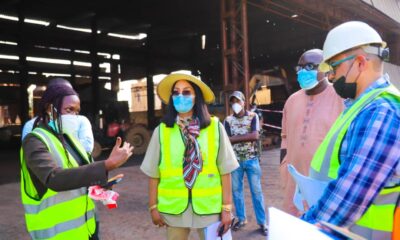Business
N400bn goods rot away over demurrage, shipping costs

There are indications that clearing processes at the nation’s major sea ports may have worsened as major congestion is building up following increase in incidences of container abandonment by importers.
Vanguard learnt that abandoned containers are now over 7,000, which have already fallen into classification as over-time cargo and accumulating huge demurrage.
Also, new containerized cargoes arriving at the port is estimated at about 2,000 in the past one month. They are expected to face the same challenges that have forced earlier ones into abandonment.
Key challenges, according to the importers and clearing agents range from use of manual cargo inspection by the Nigerian Customs Service, NCS, to rising cost of clearing associated with corruption and exchange rate volatility.
The importers and clearing agents have put the market value of abandoned cargoes at about N400 billion.
The cargoes have accumulated over N60 billion demurrage and associated costs this year alone, and the amount is rising daily.
Vanguard findings revealed that while terminal operators have slammed about N22.5 billion as rentals for the cargoes in their spaces in the first nine months of this year, shipping companies’ demurrage charges is put at N37.8billion during the same period.
READ ALSO:
- Union threatens strike ‘to cripple economy’ as FG plan to privatise TCN
- Lagos monarch allegedly punches, injures chief, alleges disrespect
- 2023: Dogara, Babachir, Muslim leaders adopt consensus candidate
A breakdown of the above figure showed that shipping firms collect approximately N20,000 per day for a container while same container attracts a fee of N12,000 per day by terminal operators.
Shipping industry operators explained that the Customs insist on not using digital scanners to inspect the cargoes, a situation which leads to long delays in clearing process and subsequently forcing cargoes to accumulate high demurrage and rental costs.
Consequently, the importers, according to Customs agents, are forced to abandon the cargo, adding that as at June this year, over N400 billion worth of cargoes have been affected by this situation.
The clearing process is also said to be tainted with corruption as freight forwarders claim they are often pressured to part with money to enable fast-track inspection.
Confirming the development, Mr. Lucky Amiwero, President of the National Council of Managing Directors of Licensed Customs Agents, NCMDLA, said that terminal operators are just having a field day making money from the Nigerian port industry.
Port industry stakeholders have specifically attributed the crises to manual examination of cargoes by the Nigerian Customs Service, NCS, despite the availability of digital scanning machines.
Nigeria is said to be one of the few countries in the world still using manual examination for cargo clearance, making the country’s ports uncompetitive against those of neighboring countries.
It will be recalled that the Customs procured about four scanning machines over a year ago at a total cost of about US$160 million.
However, the installation and utilization of the machines have been surrounded by controversies till today.
While the Service attributes the delay to the training time for its personnel that will operate the scanners as well as other reasons, some stakeholders are of the opinion that the Service is deliberately refusing to deploy the machines because the 100 per cent physical examination creates opportunity for NCS operatives to seek and collect gratifications for cargo clearance.
READ ALSO:
- ‘Masked Hoodlums’ Kill Two Police Officers in Enugu
- Obasanjo denies endorsing Tinubu, disparaging military
- NAFDAC warns against use of four killer cough syrups
Consequently, the Service still relies on manual examination of cargoes, a process which the stakeholders say is causing the delays in clearing cargoes while spaces at shipping terminals are being taken over by uncleared goods and shippers are complaining bitterly.
Financial Vanguard also learnt that there are many categories of trapped containers including export goods with many agro-perishable already rotten in the various ports.
There are also import cargoes that have been abandoned as result of being trapped and eventually caught up by the variations in exchange rate and tariffs applied by the Customs.
Moreover, Financial Vanguard learnt that a new problem has recently been added to the list with the trapping of monies paid by importers as import duties in a bank that has been suspended by the Customs for non-remittance of money collected to the Central Bank of Nigeria, CBN.
One of the importers told Financial Vanguard that “as the demurrage continues to mount daily, the congestion is getting worse and shipping companies and terminal operators are not interested in issues leading to delays and abandonment of cargoes at the ports. The cargoes are in their facilities and you have to pay for it.”
But a staff of one of the leading terminal operators told Financial Vanguard that “this does not help the terminal operators because terminal operators trade their spaces. The container terminal yard already has uncleared cargoes eating up the spaces. So when fresh containers arrive, we always have issues with space. Where to keep newer cargoes is always a dilemma because the old ones that arrived earlier are yet to be cleared due to the slow nature of Customs examination.”
He further lamented: “When the scanners arrived last year September, we were happy because to us, that should signal the end of physical examination of cargoes at the ports.
“Examining cargoes physically is a very slow process. Imagine the amount of containers that arrive our ports every day; how many can Customs officers examine physically on a daily basis? Customs officers are human beings and have their limits.
“If Customs does not examine these containers, they cannot leave the ports. But the form of examination being used is sluggish. Thus, the number of uncleared containers cluttering the ports keeps rising. It’s a dilemma that we find ourselves in the ports.
“The scanners are right there in the port. They are brand new but are not being used. It’s such a confusing situation that we find ourselves at the Apapa ports.”
Customs explains
The Customs seems to be in agreement with the need to deploy and use the scanners.
READ ALSO:
- Saka, Martinelli on target as Arsenal beat Liverpool 3-2, return to EPL top
- Ronaldo scores 700th club goal to help take Man United fifth
- FG releases amended list of national honours recipients, Saraki still missing (plus full list))
Immediate past Public Relations Officer of Onne Customs Command, Ifeoma Onuegbo, had earlier explained that the one scanner left for the Command has since been installed, but Customs agents in the command said the scanner has not been functioning properly contrary to the position of Onuegbo, who explained that the only problem was that the lone scanner is not enough to service the volume of cargo passing through the Command.
At the Apapa Customs Command, the equipment has not been put to use one year after delivery and the Command headed by Comptroller Yusuf Malanta blamed the development on ongoing works on the Lagos-Ibadan standard gauge railway track.
However, Abubakar Usman, Public Relations Officer of Apapa Area 1 Command told Financial Vanguard that modalities are complete for deployment of the scanners.
He said they are waiting for the scanners to be commissioned. He also said it is not true that the Service is deliberately delaying the deployment of the scanners for personal gains.
He noted that what is referred to as delay is preparation time.
Efforts to speak with the new Public Relations Officer of Tin-can Island Command, Nkiru Nwala, was not successful but Vanguard authoritatively gathered that the two scanners at Tin Can Island Command are also yet to be deployed.
Reacting to the issues, the spokesman of the Nigerian Customs Service, NCS, Mr. Timi Bomodi, a Deputy Comptroller of Customs, told Vanguard that the scanners are ready to be deployed adding that its deployment will be before the end of the year.
Bomodi said: “Very soon all the scanners will be put to use very very soon, we are waiting for a date for the Minister of Finance to pick a date for the commissioning and deployment of the scanners.
“Yes, definitely before the end of the year, it is just the Minister’s schedule that is delaying it, once she tells us what her schedule is and she picks a date, we are ready to go.”
But recall that the Comptroller-General of Customs, Col. Hameed Ali (rtd), had said in the past that the Service will continue with 100 per cent examination despite availability of scanners because importers are not sincere in their declaration.
Stakeholders’ perspectives
Former National Public Relations Officer of the Association of Nigeria Licensed Customs Agents, ANLCA, Joe Danni, insisted that the Customs is deliberately delaying the deployment because it wants to continue with 100 per cent physical examination which gives them opportunity to interface with importers and their agents directly.
He said what is needed is “re-calibration” which is adjusting the equipment to suit the Nigerian environment, which is what is taking the Service over a year to do.
He stated: “What they want is to continue making their personal money, they want to continue the direct interface which will give them the opportunity to demand ‘settlement’.”
READ ALSO:
- My removal was a case of corruption fighting back – Ex-EFCC chair, Magu
- Five family members found dead in Enugu apartment
- Tinubu/Shettima 5m march: Supporters defy heavy rainfall, shut down Lagos (PHOTOS + VIDEOS)
Speaking on the development, Yinka Aroyewun, president, Council of Maritime Trucks Unions and Association, COMTUA, said that several factors are responsible for containers being trapped at the ports.
On why Customs is not operating with scanning machines at the ports, Aroyewun said: “To be honest with you, after scanning, in some cases, you may need physical examination because the scanner may not be able to detect certain things; it happens.
“But the reduction of human interference which is going to be the major mile covered by scanners is not going down well with our regulating agencies. So those are some of the reasons I think Customs, in some cases, is not comfortable using scanners”.
He suggested that a way to get it right at the ports is for government to bring its political will to bear.
“We need government’s genuine political will. Apart from political will, we all need to be patriotic; all of us and the agencies of government or the regulatory agencies the Nigerian Shippers Council, the Nigerian Ports Authority, and the Council for the Regulation of Freight Forwarding in Nigeria, to come alive to their responsibilities,” he added.
President of the National Council of Managing Director of Licensed Customs Agents, NCMDLCA, Lucky Amiwero, had earlier told Vanguard that the old scanners operated by former service providers, and installed in all the ports and border stations could still be serviced and put to use.
Amiwero stressed that the Customs deliberately left the million dollars equipment acquired through Build Operate and Transfer, BOT, abandoned.
Business
Dangote urges wealthy Nigerians to invest in industries, not luxury cars, private jets

Dangote urges wealthy Nigerians to invest in industries, not luxury cars, private jets
Africa’s richest man, Aliko Dangote, has called on wealthy Nigerians to redirect funds currently spent on luxury cars and private jets into industrial investments that can generate jobs and foster sustainable economic growth.
In a widely shared interview, the Dangote Group chairman warned that the country’s elite have increasingly prioritized lavish spending over productive ventures. “If you have money to buy a Rolls-Royce, you should take that money and put up an industry in your locality or anywhere there is need,” Dangote said.
He expressed concern over the number of private jets parked at local airports, arguing that the resources tied up in such assets could instead create employment opportunities.
READ ALSO:
- Mohamed Salah Slams Liverpool Boss Arne Slot, Hints at Anfield Exit Ahead of AFCON Departure
- Indonesia Flood Disaster: Death Toll Exceeds 900 as Search for Hundreds Continues
- Russia Intensifies Airstrikes on Ukraine as Zelensky, Trump Envoys Advance Peace Talks
Dangote highlighted Nigeria’s growing population, with an estimated 7.8 million births annually, stressing that both government and private sector actors must invest in infrastructure, power, and productive businesses.
Acknowledging the country’s high taxes, he maintained that businesses must still meet their obligations. “For a company like ours, the tax we pay is too much, but we don’t mind… What we are asking for is an enabling environment, but we too must do our civic duties,” he said.
He also urged Nigerians to prioritize domestic investment over foreign capital, noting that attracting investment depends on good policy and rule of law. “We should stop calling for foreign investors because there’s no foreign investor anywhere. What attracts investment is good policy and rule of law,” Dangote added.
Dangote urges wealthy Nigerians to invest in industries, not luxury cars, private jets
Business
Imo Economic Summit: Aliko Dangote Vows to Become State’s Largest Investor

Imo Economic Summit: Aliko Dangote Vows to Become State’s Largest Investor
OWERRI — Africa’s richest man, Aliko Dangote, has assured Imo State Governor Hope Uzodimma that the Dangote Group is prepared to become one of the biggest investors in Imo State, reaffirming the conglomerate’s commitment to expanding its footprint in Nigeria.
Speaking on Thursday during the opening session of the Imo Economic Summit 2025, Dangote called on the state government to specify key sectors requiring investment, promising immediate action once directives are given.
Dangote, who described Governor Uzodimma as a long-time friend, commended him for fostering an enabling environment for business and economic growth in the state.
READ ALSO:
- NSCDC rejects VIP protection requests from senators as demand surges after police withdrawal
- Edo Assembly Moves to Arrest Obaseki, Others Over MOWAA, Radisson Hotel Probe
- Three Top Contenders to Replace William Troost-Ekong as Super Eagles Captain
“We will be one of your biggest investors in Imo. So please tell me the area to invest and we will invest,” he said.
The African industrialist also encouraged Nigerian entrepreneurs to focus on developing their home regions, stressing that sustainable economic growth cannot depend on foreign capital alone.
“What attracts foreign investors is a domestic investor. Africa has about 30 percent of the world’s minerals. We are blessed,” he noted.
Dangote further highlighted progress at the Dangote Refinery, announcing that the facility is on track to achieve a 1.4 million barrels-per-day production capacity, making it the largest single-train refinery in the world.
The assurance marks a significant boost for Imo State’s investment outlook as the government continues efforts to strengthen its economy and attract large-scale private sector participation.
Imo Economic Summit: Aliko Dangote Vows to Become State’s Largest Investor
Auto
Court of Appeal Affirms Ruling Barring VIO from Seizing Vehicles or Fining Motorists

Court of Appeal Affirms Ruling Barring VIO from Seizing Vehicles or Fining Motorists
The Court of Appeal, Abuja, on Thursday, upheld a previous Federal High Court judgment prohibiting the Vehicle Inspection Officers (VIO) and the Directorate of Road Traffic Services (DRTS) from confiscating vehicles or imposing fines on motorists without lawful authority.
A three-member panel of appellate justices, led by Justice Oyejoju Oyewumi, dismissed the appeal filed by the VIO, describing it as lacking merit and affirming the October 16, 2024 ruling of the high court.
The original suit, marked FHC/ABJ/CS/1695/2023, was filed by public interest lawyer Abubakar Marshal, who alleged that he was unlawfully stopped and had his vehicle confiscated by VIO officials at Jabi District, Abuja, on December 12, 2023. He contended that the action was a violation of his fundamental rights.
READ ALSO:
- FG secures release of three Nigerians detained in Saudi Arabia
- Groups Reject Senator’s Call for Removal of NSA Nuhu Ribadu
- US authorities arrest Nigerian CEO Cashmir Chinedu Luke for alleged $7m VA fraud
Justice Nkeonye Maha of the Federal High Court had declared that no law empowers the VIO to stop, seize, impound, or fine motorists, and granted a perpetual injunction restraining the agency and its agents from further violating citizens’ freedom of movement, presumption of innocence, and right to own property.
The court held that only a court of competent jurisdiction can impose fines or sanctions on motorists. It further ruled that the actions of the Respondents violated Section 42 of the 1999 Constitution and relevant articles of the African Charter on Human and Peoples’ Rights.
Although the applicant had sought N500 million in damages and a public apology, the court awarded him N2.5 million. Respondents included the Director of the Directorate of Road Traffic Services, the Abuja Area Commander, the team leader, and the Minister of the Federal Capital Territory.
The appellate court’s decision confirms that the VIO and DRTS cannot legally harass motorists, reinforcing citizens’ constitutional rights on the road.
Court of Appeal Affirms Ruling Barring VIO from Seizing Vehicles or Fining Motorists
-

 metro3 days ago
metro3 days agoSenate Launches Emergency Probe into Widespread Lead Poisoning in Ogijo, Lagos/Ogun
-

 News3 days ago
News3 days agoBREAKING: Tinubu Sends Fresh Ambassadorial Nominations to Senate, Names Ibas, Ita Enang, Dambazau
-

 Auto3 days ago
Auto3 days agoCourt of Appeal Affirms Ruling Barring VIO from Seizing Vehicles or Fining Motorists
-

 Sports1 day ago
Sports1 day ago2026 FIFA World Cup Draw: England Draw Croatia as Brazil Face Morocco in Tournament Opener
-

 News3 days ago
News3 days agoUS authorities arrest Nigerian CEO Cashmir Chinedu Luke for alleged $7m VA fraud
-

 metro3 days ago
metro3 days agoFG secures release of three Nigerians detained in Saudi Arabia
-

 metro3 days ago
metro3 days agoNed Nwoko vows legal action against rising online harassment, criminal defamation
-

 metro3 days ago
metro3 days agoBuratai Defends Nigeria’s Resilience, Says Nation Is “Rising, Not Failing” Despite Insecurity







